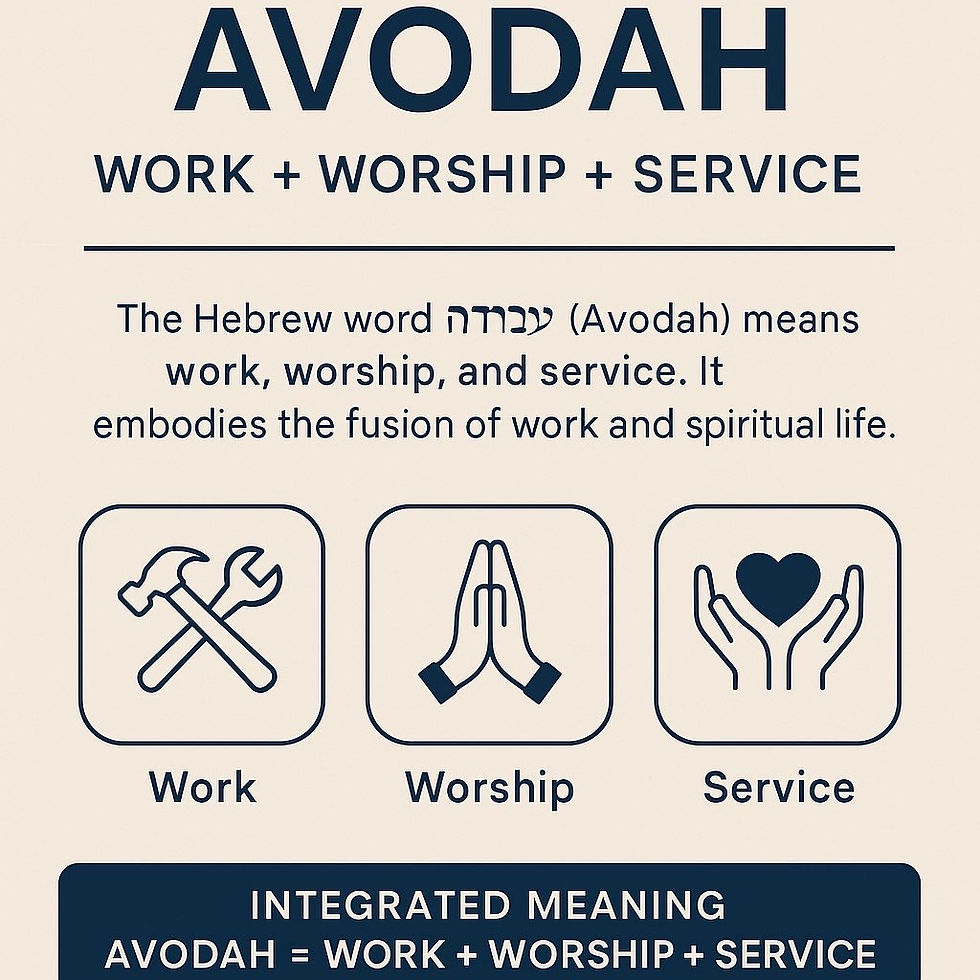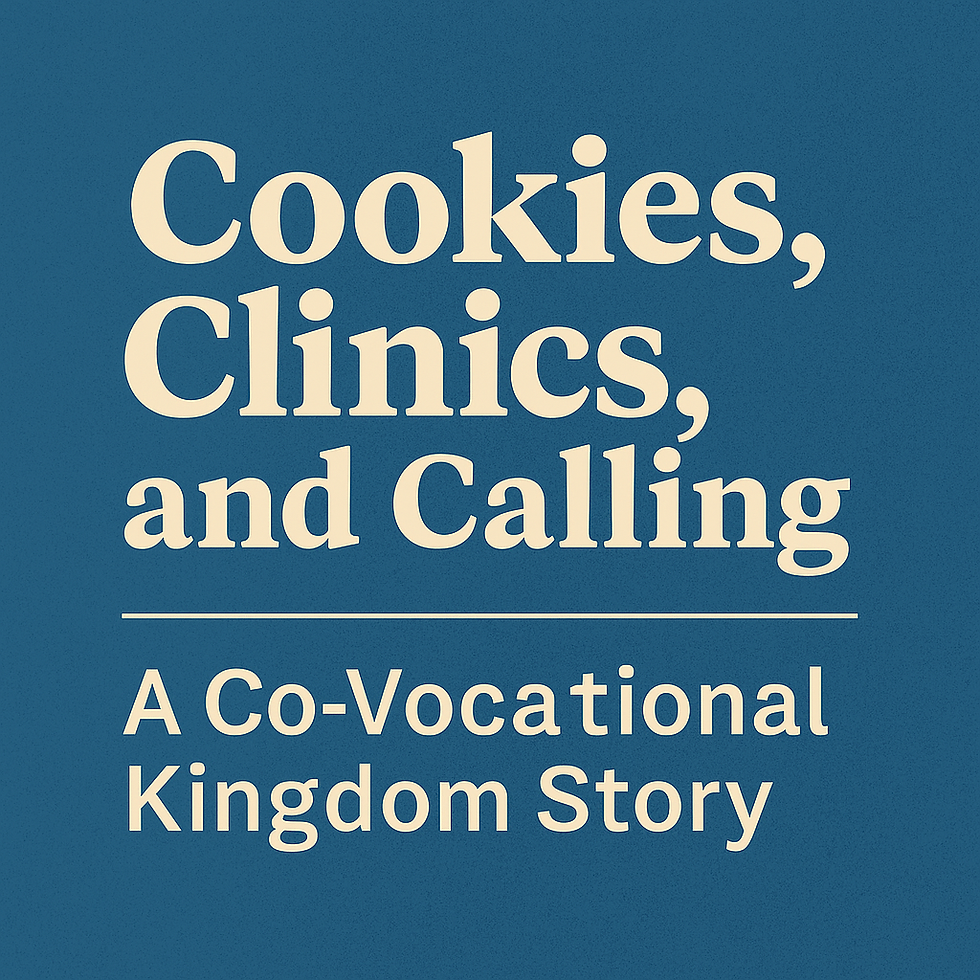Avodah: Recovering the Sacred Work of Worship
- Dave Miller

- Aug 5, 2025
- 6 min read
by the CoVo Multipliers Network

Introduction: Rediscovering the Heart of Work
The Hebrew word Avodah (עֲבוֹדָה) is commonly translated as work, service, or worship. While these three terms might seem like distinct concepts in modern usage, Avodah weaves them together as one unified thread throughout Scripture. In the biblical worldview, there is no division between sacred and secular labor—only the question of for whom the labor is done.
But in today’s culture, many believers unconsciously associate work with the curse. We live in a world that often views labor as oppressive, burdensome, and separate from true spiritual purpose. Tragically, this mindset creeps into the church, causing us to forget that before the fall, work was not only good—it was a gift.
This article highlights the journey of the CoVo Multipliers 4-hour Scripture Deep Dive Study into Avodah through key biblical texts, warning of its distortion and recovering its ontological roots. We’ll explore why understanding Avodah is essential to living out a convocational calling—where all of life, including work, is leveraged for the glory of God.
1. Genesis 2:15 – Avodah as God’s Original Design for Humanity
“The Lord God took the man and put him in the Garden of Eden to work it and take care of it.” (Genesis 2:15)
Before the fall, before sin, before pain—there was work. And it was good.
In this foundational verse, we see that Adam was not simply placed in paradise to relax. He was tasked with cultivating the garden—an act of Avodah. This was not toil; it was a dignified assignment rooted in co-laboring with God.
Key Outcomes:
Work was intended to be fruitful, joyful, and productive—not cursed.
There was no disconnect between worship and labor; to work was to worship.
Humanity was meant to nurture creation, reflecting the image of God through purposeful activity.
Implications:
The original design of work was not a punishment—it was a participation in divine purpose. The act of working the garden was itself an act of glorifying God. This overturns modern misconceptions and reorients our understanding of labor as inherently sacred.
2. Exodus 1:8–14 – The Corruption of Work Under Pharaoh
“They made their lives bitter with hard labor… in all their harsh labor the Egyptians worked them ruthlessly.” (Exodus 1:14)
When God’s people were enslaved in Egypt, work became distorted. What was designed to be worshipful turned into forced servitude. Pharaoh’s command dehumanized labor and turned it into a tool of oppression.
Key Outcomes:
Work became dignity-stripping and disconnected from God’s purpose.
It was exploited for the glory of man, not God.
Pharaoh acts as a false god, misusing Avodah to build his own kingdom.
Implications:
When work is detached from God, it becomes a source of bondage. This not only applies historically, but also spiritually and culturally today. Many people, even Christians, operate under a modern-day Pharaoh mindset—believing that their work has no spiritual value unless it’s overtly “ministry.”
3. Exodus 8:1 – God Redeems Avodah for Worship
“Let my people go, so that they may serve (avodah) me.” (Exodus 8:1)
God’s first major act of redemption for a people group wasn’t just about freeing them—it was about restoring them to true worship through work. The same Hebrew word used for their slavery (avodah) is used here, but in a redemptive context.
Key Outcomes:
God reclaims Avodah from Pharaoh and redirects it toward Himself.
He defines freedom not as the absence of work, but as the restoration of right worship.
The invitation to worship is tied to covenant identity and divine service.
Implications:
Freedom in the kingdom doesn’t mean we stop working—it means we work rightly, for the right King. This verse reframes the goal of deliverance: not just rest, but redeemed service that brings joy and dignity.
4. Exodus 34:21 – Sabbath as a Theology of Gratitude and Rhythm
“You have six days each week for your ordinary work, but on the seventh day you must stop working…” (Exodus 34:21, NLT)
God institutes Sabbath not just as a break from work but as an act of thanksgiving. It is the culmination of a week’s labor, where we bring the firstfruits of our hands and hearts before God in joyful remembrance.
Key Outcomes:
The Sabbath was a feast of worship, a day to pause and thank God.
Even during plowing and harvest, rest was required—trusting in God’s provision.
This created a sacred rhythm that elevated all work as holy.
Implications:
Sabbath is not the end of work, but the celebration of it. By embedding rest into the cycle of productivity, God reconnects Avodah to joy, remembrance, and relational worship. It shatters the sacred-secular divide and makes ordinary labor sacred.
5. Numbers 4:47 – Vocational Assignment as Worship
“All those who were to serve and carry [the tabernacle] were registered by name…” (Numbers 4:47)
Even the most practical, physical tasks—like transporting the tabernacle—were counted as acts of worship. The Levites weren’t just priests; some were assigned to logistics, setup, and transport. All of it was holy.
Key Outcomes:
All types of work, even manual labor, are sacred when assigned by God.
Ministry includes invisible support roles, not just public spiritual ones.
God’s people are called by name for their specific vocational roles.
Implications:
In the convocational vision, we reject the false hierarchy that sees “church work” as more holy than other professions. Every person has a calling, and when that calling is done in faith and obedience, it is worship.
6. New Testament Fulfillment – Jesus as Our True Avodah
“Whatever you do, work at it with all your heart, as working for the Lord…” (Colossians 3:23)
Jesus not only redeems our souls—He redeems our work. In Him, our labor is no longer in vain. The resurrection power of Christ transforms even the mundane into ministry. Paul encourages slaves and free people alike to view their Avodah as worship unto the Lord.
Key Outcomes:
Jesus breaks the power of oppression and reframes labor as kingdom service.
Believers can now worship through all work, regardless of position or task.
The ultimate Sabbath rest is found in Christ Himself (Hebrews 4:9–11).
Implications:
Because of Jesus, our daily work is no longer under the curse subject to Pharaohs—it belongs to the Lord. Whether we’re entrepreneurs, parents, tradesmen, or pastors, all vocations can reflect God’s glory when they are done in faith, obedience, and gratitude.
Practical Reasons Avodah Must Be Recovered
The concept of Avodah is not just theological—it’s profoundly practical, especially for those living out a convocational calling. Here’s why:
1. Restores Purpose to Daily Life
Understanding Avodah reintegrates our faith into the 9–5. It allows us to see every task as part of God’s redemptive work in the world.
2. Elevates the Value of All Vocations
Whether building a business, teaching a child, or repairing a fence, all work becomes sacred when done with God.
3. Fights the Lie That God is Oppressive
One of the greatest barriers to the gospel is the belief that following God will lead to a loss of freedom. Avodah shows that true obedience leads to flourishing, not oppression.
4. Offers a Framework for Disciple-Making in the Workplace
Most people spend the majority of their waking hours at work. If we can see our work as worship, the workplace becomes a primary field for mission and formation.
5. Strengthens Sabbath as Celebration, Not Escape
Avodah gives Sabbath new depth—it’s not about escaping work, but feasting on its fruit and remembering God’s faithfulness.
Conclusion: The Convocational Call to Worship Through Work
In a world that divides the sacred from the secular, Avodah calls us back to wholeness. From Eden to Egypt, from Sabbath to the tabernacle, from the cross to your daily calendar—God is redeeming work.
The invitation is not merely to be freed from slavery but to be restored to worship. And that worship is expressed not only in songs and prayers but in spreadsheets and shovels, in hospitality and craftsmanship, in raising children and raising barns.
This is the core of the covocational conviction—that every follower of Jesus is a full-time minister, right where they love, work, and play.
Let Avodah be more than a word. Let it be a way of life.
Discover for Yourself




Comments